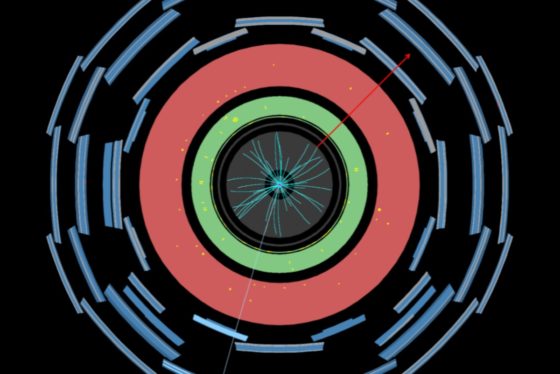
Enlarge / Event display of a W-boson candidate decaying into a muon and a muon neutrino inside the ATLAS experiment. The blue line shows the reconstructed track of the muon, and the red arrow denotes the energy of the undetected muon neutrino. (credit: ATLAS Collaboration/CERN)
It’s often said in science that extraordinary claims require extraordinary evidence. Recent measurements of the mass of the elementary particle known as the W boson provide a useful case study as to why. Last year, Fermilab physicists caused a stir when they reported a W boson mass measurement that deviated rather significantly from theoretical predictions of the so-called Standard Model of Particle Physics—a tantalizing hint of new physics. Others advised caution, since the measurement contradicted prior measurements.
That caution appears to have been warranted. The ATLAS collaboration at CERN’s Large Hadron Collider (LHC) has announced a new, improved analysis of their own W boson data and found the measured value for its mass was still consistent with Standard Model. Caveat: It’s a preliminary result. But it lessens the likelihood of Fermilab’s 2022 measurement being correct.
“The W mass measurement is among the most challenging precision measurements performed at hadron colliders,” said ATLAS spokesperson Andreas Hoecker. “It requires extremely accurate calibration of the measured particle energies and momenta, and a careful assessment and excellent control of modeling uncertainties. This updated result from ATLAS provides a stringent test, and confirms the consistency of our theoretical understanding of electroweak interactions.”
Read 9 remaining paragraphs | Comments



